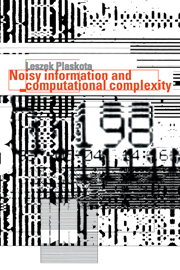2 - Worst case setting
Published online by Cambridge University Press: 13 January 2010
Summary
Introduction
In this chapter we study the worst case setting. We shall present results already known as well as showing some new results. As already mentioned in the Overview, precise information about what is known and what is new can be found in the Notes and Remarks.
Our major goal is to obtain tight complexity bounds for the approximate solution of linear continuous problems that are defined on infinite dimensional spaces. We first explain what is to be approximated and how an approximation is obtained. Thus we carefully introduce the fundamental concepts of solution operator, noisy information and algorithm. Special attention will be devoted to information, which is most important in our analysis. Information is, roughly speaking, what we know about the problem to be solved. A crucial assumption is that information is noisy, i.e., it is given not exactly, but with some error.
Since information is usually partial (i.e., many elements share the same information) and noisy, it is impossible to solve the problem exactly. We have to be satisfied with only approximate solutions. They are obtained by algorithms that use information as data. In the worst case setting, the error of an algorithm is given by its worst performance over all problem elements and possible information. A sharp lower bound on the error is given by a quantity called radius of information. We are obviously interested in algorithms with the minimal error.
- Type
- Chapter
- Information
- Noisy Information and Computational Complexity , pp. 5 - 120Publisher: Cambridge University PressPrint publication year: 1996



